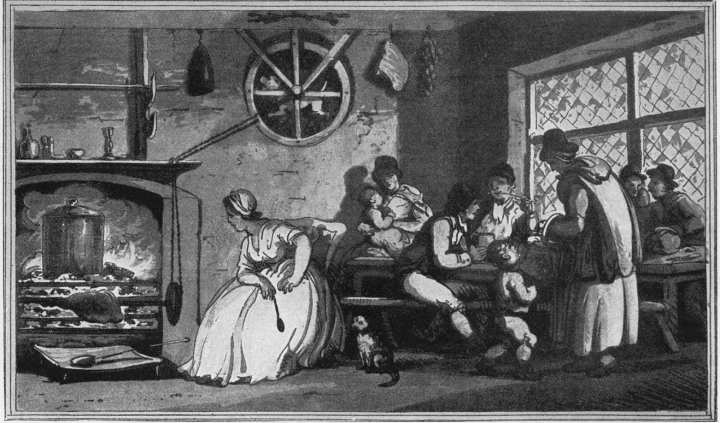I can't help thinking that these poor foundlings could really use a bite of Americana: a burger.
But long before the burger had assumed its place in the American culinary lexicon, the beef-steak had already been fashioned into a quintessential symbol of Englishness. Unlike French fricassees and raggoos, drowned in sauces to the point where you couldn't be sure what you were eating (which patriots were quick to claim was rancid meat) English beef, for the most part, came to the table roasted and unadorned. What you see was what you got. Check out the piece of meat roasting over the spit in the bottom left corner below, in plain view of the company.
 |
| "A Dog Turn-spit in a Kitchen" by Thomas Rowlandson Note the dog –– hard at work –– at the top center: |
I think I mentioned its special status within the Thursday's Club before, but the fashionable and cosmopolitan Royal Society wasn't the only place where beef was treated as something beyond simply a a tasty treat. In 1761, the Lord Mayors Banquet planning committee passed a resolution that “... two chines of roast beef be provided for sideboard in the hall with two flags, one the Standard of England and the other the City Army."
We don't really know if these chines on display were meant to be eaten or simply displayed, and we obviously can't use the Lord Mayor's Feast as an indicator of the typical English diet. Odes to beef are all over the place in 18th century English history, but it's worthwhile to compare all this jingoistic hyperbole to the actual records of what people are eating. So I was pretty excited to find, going through these Foundlings' Dietaries, a stipulation (given in 1758) that the children should get a dinner of roast beef and plumb pudding for dinner every 17th of October (that being the date of the Hospital's Charter).
Seems like beef –– unlike venison and turtle soup –– was deemed a morally acceptable treat for even the poorest of the poor. For most people, beef was deemed to be every Englishman's bread and butter, but for the poor foundlings, it was synonymous with celebration. But the beef consumed by the poor foundlings didn't exactly fall into the same category as the delectable prime, tender, dry aged cuts enjoyed at steak-houses today. The Hospital's butchers' bills indicate that, most of the time, the children were dining on cheap shoulder clods, "veiny pieces" and cuts "with gristle, for roasting." In fact, a hospital physician complained in 1776 about children having to swallow large pieces of meat whole, as the quality of the meat was so poor (and the knives so bad) that they weren't even able to cut it.
No, my gentle readers, it seems like not every foundling had a Squire Allworthy to help him out of some pretty dire situations. Perhaps the symbolic weight accorded to English beef could come into conflict with an enjoyable meal. But Burger Monday awaits, so I wearily lay down my pen, confesses,
Your ever obliging and affectionate,
L.Q.
No comments:
Post a Comment